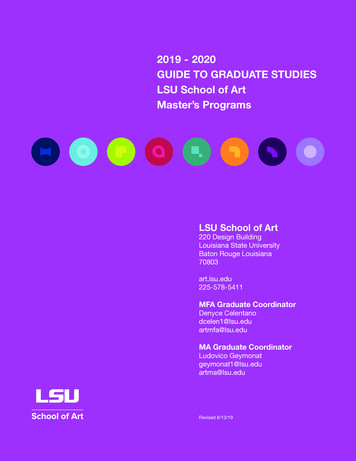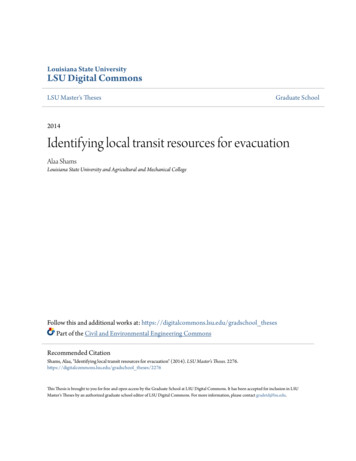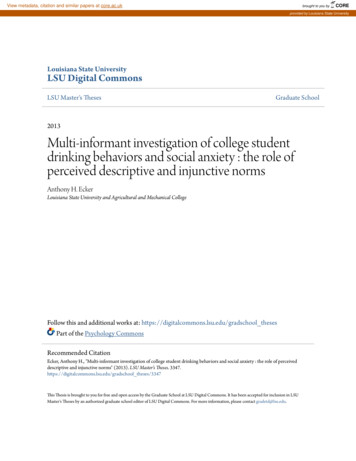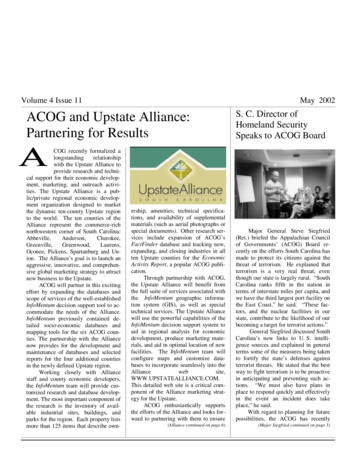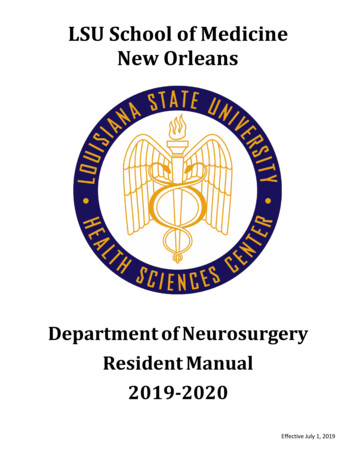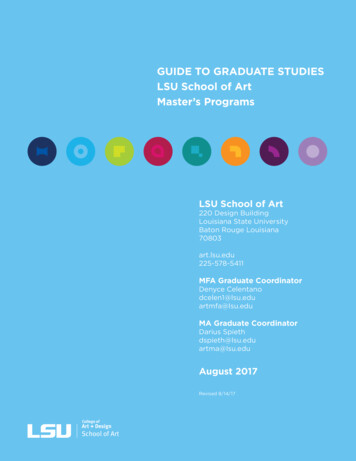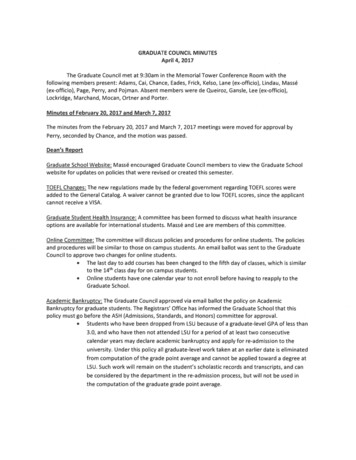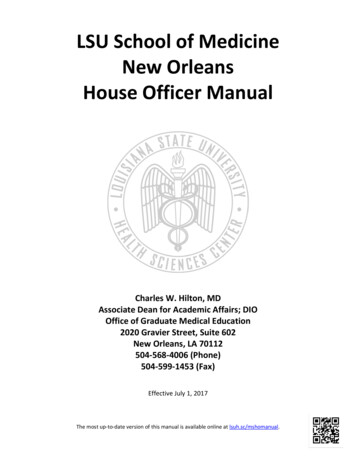
Transcription
LSU School of MedicineNew OrleansHouse Officer ManualCharles W. Hilton, MDAssociate Dean for Academic Affairs; DIOOffice of Graduate Medical Education2020 Gravier Street, Suite 602New Orleans, LA 70112504‐568‐4006 (Phone)504‐599‐1453 (Fax)Effective July 1, 2017The most up‐to‐date version of this manual is available online at lsuh.sc/mshomanual.
LSUHSCSCHOOL OF MEDICINEOFFICE OF GRADUATE MEDICAL EDUCATIONHOUSE OFFICER MANUAL 2017‐18TABLE OF CONTENTSINTRODUCTION . 3STATEMENT ON PROFESSIONALISM . 3DEFINITIONS . 5HOUSE OFFICER ELIGIBILITY AND SELECTION(EXCEPT ORAL SURGERY AND DENTALRESIDENTS) . 5COMPENSATION, INCLUDING GRATIS ANDSELF‐FUNDED POSITIONS . 7HOUSE OFFICER SUPPORT . 7INSTITUTIONAL HOUSE OFFICER POLICIES . 7EVALUATION AND PROMOTION OF HOUSEOFFICERS. 8RESIDENT TRANSFERS . 8MEDICAL SPECIALTY BOARD INFORMATION . 8PRELIMINARY INTERVENTION . 8PROBATION . 8CONDITIONS FOR REAPPOINTMENT. 9TERMINATION, NON‐REAPPOINTMENT,AND OTHER ADVERSE ACTION . 9DUE PROCESS . 9SUMMARY SUSPENSIONS . 12OTHER GRIEVANCE PROCEDURES. 12OMBUDSMAN . 13REVIEW OF TRAINING PROGRAMS . 13POLICY REGARDING VISITINGPHYSICIANS/HOUSE OFFICERROTATIONS . 13OUT OF STATE SERVICE POLICY . 13EEO POLICY. 14SEXUAL HARASSMENT POLICY . 14DRUG‐FREE WORKPLACE POLICY . 15FITNESS FOR DUTY POLICY . 16LEAVE . 16VACATION LEAVE . 17MILITARY LEAVE . 17LEAVE OF ABSENCE. 17MATERNITY/PATERNITY LEAVE . 17EDUCATIONAL LEAVE . 17FAMILY LEAVE . 17SICK LEAVE . 17PAGERS . 18PARKING . 18DRESS CODE . 18EDUCATIONAL RESOURCES . 18HEALTH INSURANCE . 18DISABILITY INSURANCE. 18DISABILITY POLICY . 18LAB COATS, MEALS, NIGHT CALL . 19MALPRACTICE INSURANCE . 19DEA NUMBERS . 19MOONLIGHTING . 19INSTITUTIONAL POLICY ON CLINICAL ANDEDUCATIONAL WORK HOURS . 21SIX GENERAL COMPETENCIES . 23CAMPUS ASSISTANCE PROGRAM (CAP) . 24RESTRICTIVE COVENANTS . 24INSTITUTION/HOUSE OFFICERCLOSURE/REDUCTION POLICY . 24COMMITTEE AND OTHER SERVICE . 24DRUG TESTING REQUIREMENT (PRE‐EMPLOYMENT) . 25OCCUPATIONAL INJURY/DISEASEPROCEDURES. 25POLICY ON HOLIDAY SCHEDULE . 26MEDIA POLICY . 26VENDOR/INDUSTRY RELATIONS POLICY . 26NEW INNOVATIONS MEDICAL EDUCATIONMANAGEMENT SUITE . 27CLIQ AND SMARDI . 271
2
LSU SCHOOL OF MEDICINE ‐ NEW ORLEANSHOUSE OFFICER MANUALIn the event a program or departmental policy or guideline conflicts with the LSU SOM NO House OfficerManual, the House Officer Manual takes precedence. (rev 11/23/13)INTRODUCTIONThe principal purpose of the LSU School of Medicine ‐ New Orleans (School of Medicine) is to provide a richlearning environment for the education and training of medical students, residents, and fellows in concertwith the General and Special Requirements of the Accreditation Council for Graduate Medical Education(ACGME). Because the majority of our House Officers remain in the state, Graduate Medical Education is amission of paramount importance to the School of Medicine and to the citizens of Louisiana. This mission isfulfilled through accomplishing the following goals:1. Diverse specialty and subspecialty training programs offered by the departments.2. Cultivation of the concept that medical education is a life‐long continuum. Trainees should develop apersonal program of self study under guidance of the faculty.3. Refinement of cognitive and technical skills through direct involvement in safe, effective,compassionate patient care under the direction of the faculty, senior House Officers, and fellows.Privileges and duties shall be the responsibilities of the Departments and commensurate with the levelof advancement, capability and responsibility of the trainee.4. A review of pertinent basic science information and expansion of intellectual and technical skillsthrough a multitude of clinical experiences. Trainees should participate in the educational andscholarly activities of their departments, training hospitals, and the School, including institutionalcommittees and quality assurance activities.5. Enhancement of the ability to deliver quality patient care in a variety of clinical settings.6. Refinement of interpersonal skills in dealing with patients and patients’ families.7. Development of an understanding and appreciation for office and information management, datamanagement, health care financing, cost containment, and socioeconomic, medico‐legal, and ethicalissues.8. Cultivation of skills relating to teaching of patients and students.9. Participation in the evaluation of medical students, faculty and of the quality of their individual trainingprograms.10. Appreciation of the need for and involvement in clinical and basic science research.11. Assurance that, in the event of elimination or downsizing of a training program, every effort will bemade to allow trainees in that program to complete that program, if possible. If not possible, theschool will make every effort to assist the trainee in finding another training program.STATEMENT ON PROFESSIONALISMOf the 6 competencies discussed later, a commitment to Professionalism actually leads to improvement in allof the other competencies and is critical to our continued existence as a profession and your successfuldevelopment and performance as a physician. Without a daily recognition and commitment to the3
requirements to be a professional, you can never truly realize your potential or achieve and maintain theexpectations society has for you. You will see both professional and unprofessional behavior during yourtraining and, through learning, mentoring, evaluation, self‐reflection, and continued professionaldevelopment, develop the set of characteristics that define you over time. Many if not most of the problemsyou will encounter in the future can be minimized if not avoided by strict adherence to the followingprinciples.The Elements of Professionalism are:1. Altruism2. Accountability3. Excellence4. Duty5. Honor and Integrity6. Respect for othersThey are partly defined as:Altruism ‐ the “essence” of professionalism. Putting the best interests of patients, not self‐interest,first.Accountability ‐to patients ‐ for fulfilling the implied contract governing the physician patient relationship.to society ‐ for addressing the health needs of the public.to our profession ‐ for adhering to medicine’s time‐honored ethical precepts.Excellence ‐ entails a conscientious effort to exceed ordinary expectations and to make a commitmentto life‐long learning.Duty ‐ a commitment to service which entails:being available and responsive when “on call” .accepting inconvenience to meet the needs of one’s patients.enduring unavoidable risks to oneself when a patient’s welfare is at stake.advocating the best possible care regardless of ability to pay.seeking active roles in professional organizations (AMA, LSMS, OPMS).volunteering one’s skills and expertise for the welfare of the community.Honor and Integrity including ‐being fair, being truthful, keeping one’s word.meeting commitments, being straightforward.recognizing conflicts of interest and avoidance of relationships that allow personal gain tosupersede the best interest of the patient.Respect for others including ‐patients, families, other physicians.professional colleagues such as nurses, medical students, residents, fellows.You will be evaluated for adherence to the above principles in many ways including monthly evaluations, semi‐annual evaluations, OSCEs, 360 and peer evaluations and others. In addition to the above, behaviors thatreflect a commitment to professionalism include completion of all tasks which are assigned to you includingaccurately logging and adhering to clinical and educational work hour standards, medical records, case logs,attendance at conferences, alertness management, assurance of fitness for duty, recognition of impairment,adherence to policies governing transitions of care, working Core Modules and other on line assignments,4
maintenance of licensure and certifications, awareness of and compliance with institutional policies,adherence to policies and procedures in GME including those in the House Officer Manual, and other programand institutional requirements. (GMEC approved 7/19/2012)DEFINITIONSFor purposes of this Manual, the following terms shall have the meaning ascribed thereto unless otherwiseclearly required by the context in which such term is used.House Officer ‐ The term “House Officer” shall mean and include interns, residents and fellows.Program – The term “Program” shall mean a Resident and Fellow Training Program of Louisiana StateUniversity School of Medicine in New Orleans.Dean ‐ The term “Dean” shall mean the Dean of the Louisiana State University School of Medicine in NewOrleans or his “designee”.Academic Dean – The term “Academic Dean” shall mean the Dean of Academic Affairs of the Louisiana StateUniversity School of Medicine in New Orleans or his “designee”.Working Days – The term “working days” shall mean Monday through Friday.HOUSE OFFICER ELIGIBILITY AND SELECTION (EXCEPT ORAL SURGERY AND DENTAL RESIDENTS) (revised 5/2016)House Officer selection criteria must conform to the guidelines of the Accreditation Council for GraduateMedical Education (ACGME) General Requirements where applicable. House Officers are selected by programdirectors from an applicant pool in the National Residency Matching Program (NRMP) or from NRMP SpecialtyMatching Services programs.United States Citizens, Permanent Residents of the US, and J1 Visa holders sponsored by the ECGMG are theonly applicants eligible for selection. As noted in Chancellor Memorandum 39 (CM‐39) ECFMG sponsorship asa J‐1 exchange visitor is the appropriate and only mechanism whereby foreign physicians may enter graduatemedical education/training programs at the LSU Health Sciences Center.First year House Officers must participate through the NRMP programs. Only in the absence of an NRMPmatching program in a particular discipline or at an advanced level of appointment, may candidates competeand be appointed individually. Such candidates must meet all the ACGME General Requirements for selectionof House Officers.House Officers must be (1) graduates of medical schools in the United States and Canada accredited by theLiaison Committee on Medical Education (LCME); (2) graduates of colleges of osteopathic medicine in theUnited States accredited by the American Osteopathic Association (AOA); (3) graduates of medical schoolsoutside the United States who have received a currently valid certificate from the Education Commission forForeign Medical Graduates or have a full and unrestricted license to practice medicine in a United Stateslicensing jurisdiction; or (4) graduates of medical schools outside the United States who have completed aFifth Pathway Program by an LCME‐accredited medical school.[A Fifth Pathway program is an academic year of supervised clinical education provided by an LCME‐accreditedmedical school to students who a.) have completed, in an accredited college or university in the United States,undergraduate premedical education of the quality acceptable for matriculation in an accredited United States5
medical school; b.) have studied at a medical school outside the United States and Canada but listed in theWorld Health Directory of Medical schools; c.) have completed all of the formal requirements of the foreignmedical school except internship and/or social service; d.) have attained a score satisfactory to the sponsoringmedical school on a screening examination; and e.) have passed either the foreign Medical GraduateExamination in the Medical Sciences, Parts I and II of the examination of the National Board of MedicalExaminers, or Steps 1 and 2 of the United States Medical Licensing Examination (USMLE).] .All fellow eligibility exceptions must have prior GMEC and DIO approval before ranking the candidate oroffering a training position.Eligible House Officer Candidates will be selected on the basis of their preparedness, ability, aptitude,academic credentials, communication skills and personal qualities such as motivation and integrity. Thenumber and apportionment of House Officers will depend on educational opportunities, the patientpopulation, levels of illnesses, types of procedures, number of staff available for supervision, financialresources of in‐patient and out‐patient care facilities, and recommendations of the Residency ReviewCommittees (RRC). The Graduate Medical Education Committee and the Academic Dean supervise the overallnumber of positions offered and the apportionment of House Officers among services and departments.All House Officer trainees must have a valid active license or permit to practice medicine in the State ofLouisiana, or DDS license in the case of Dental resident and pre‐MD Oral Surgery residents. The LouisianaState Board of Medical Examiners issues temporary training permits to qualified post‐graduate year I leveltrainees. Temporary permits (Visiting Resident Permits) also may be issued for certain foreign medicalgraduates entering the U.S. on J‐1 visas. Foreign citizen trainees must have standard Educational Commissionfor Foreign Medical Graduates (ECFMG) certification. Rules and regulations regarding trainees with visasfrequently change. When questions regarding visas arise the GME Office will refer all questions to the LSUHSCOffice of Governmental Relations for final determination to ensure compliance with all institutional, state andFederal rules and regulations.Requirements for medical licensure change from time to time. The Louisiana State Board of Medical Examiners(LSBME) requires passage of USMLE Step 3 before the end of the PGY 2 year to issue a permit or license tobegin PGY 3 training. (revised 11/25/13). Because of the wait times between sitting for the USMLE and thereporting time, residents not passing USMLE Step 3 by March 1 of their PGY 2 are subject to automatic non‐renewal of their contract to enter the PGY 3. Some programs may have more restrictive policies. The rules forhow many times the USMLE can be taken and the waiting times required between sitting for the test change.For this reason, the House Officer is urged to regularly review these specific rules.As part of the licensure process the LSBME uses a service of the Federation of State Medical Boards (FSMB)called the Federation Credentials Verification Service (FCVS). Once house officers have applied for permit /licensure LSU training programs will be completing an updated FCVS form on house officers each year so thatat graduation FCVS has a completed record on the trainee that will greatly facilitate credentialing in his/herlater professional career. When a house officer starts a residency the program office will have each traineesign a release for all years of training. (revised 1/19/09).All applicants and trainees must contact the Louisiana State Board of Medical Examiners (LSBME) regardingrequired examinations and documentation necessary for any form of training permits and licensure.6
House Officers are appointed for one year. Contract renewal is subject to mutual written consent of theDepartment Head and the House Officer. This renewal must be made in a timely manner in accordance withACGME requirements as outlined in our Policy and Procedure Manual and with dates set by the GME Office.COMPENSATION, INCLUDING GRATIS AND SELF‐FUNDED POSITIONSCompensation will be provided consistent with the pay scale recommended by the Graduate MedicalEducation Committee. Work hours will vary within each House Officer training program. Gratis appointments,including self‐funded are not permitted in ACGME approved training programs. Trainees on J‐1 visas are notpermitted to be in gratis or self‐funded positions. In extenuating circumstances, the Dean may makeexceptions to this policy. (revised 7/1/2005)House Officer level and compensation is based on a resident successfully completing all requirements foracademic promotion to the next PGY level. Residents not academically promoted or who must repeat all orpart of a year prior to academic promotion will be paid at the current PGY level until academically promotedby the program.(approved by GMEC 1/2011).HOUSE OFFICER SUPPORTThe mission of the Graduate Medical Education Office is to support the House Officers and the trainingprograms of the School of Medicine. The Office of Graduate Medical Education (GME) offers House Officersthe opportunity to participate in group long term disability coverage. In the event a House Officer experiencesa loss of income as a result of an emergency, the House Officer should contact the Associate Dean forAcademic Affairs for possible avenues of assistance.In order to enhance the House Officer’s training experience, the Office of Graduate Medical Education hasdeveloped a series of Core Curriculum On‐line Modules to assist the resident learning in essential areas. Allresidents are expected to complete all assigned modules. The Office of Graduate Medical Educationadministers the House Officer Payroll; processes education loan deferment certifications, applications forInternship Registration and Verification of Internship forms for the Louisiana State Board of MedicalExaminers; and coordinates House Officer Orientation LSBME License Application Day and Residency Fair Day.INSTITUTIONAL HOUSE OFFICER POLICIESThe LSU School of Medicine – New Orleans (School of Medicine) is responsible for supervising House Officertraining programs. This responsibility is delegated to individual departments and is fulfilled by the medicalfaculty. The level of supervision must be commensurate with the House Officer's level of training and theHouse Officer’s individual level of clinical skills. On‐call schedules for faculty are designed so that supervisionand/or consultation is readily available at all times to House Officers on duty. Each Department hasestablished policies for House Officers that will be consistent with the ACGME General Requirements andSpecial Requirements of each program.At the beginning of each academic year, each House Officer Program will provide the House Officer an outlineof specific rotations and regularly scheduled lectures, conferences and seminars. House Officers will beinformed about departmental duties and disciplinary policies during orientation and/or by written guidelines.These policies will describe training goals and expectations, program evaluation methods, possible basis foradverse actions such as probation or dismissal, and due process procedures.7
The educational effectiveness of each House Officer Program will be periodically reviewed by departmentalfaculty. Reviews will include resident evaluations of faculty and the House Officer Program and facultyevaluations of program effectiveness.EVALUATION AND PROMOTION OF HOUSE OFFICERSRecords of House Officer evaluations are to be maintained by the Departmental Program Directors. Thesefiles will generally be available for review to the individual trainees, training faculty, Program Director, andother University personnel as may be required by the LSU House Officer Program, School Of Medicine, orUniversity (Health Sciences Center). House Officers are not given partial or complete copies of their files. Inthe cases where an outside entity is requesting information directly on a resident, upon receiving a validrelease of information from our website, LSU will supply the requested information directly to the requestinginstitution. House Officers will be formally evaluated no less than twice a year; however, more frequentfeedback is encouraged. Both strengths and weaknesses should be documented and discussed in theevaluation process, as well as plans to remediate any deficiencies.Evaluation of House Officers will follow the ACGME requirements for evaluations. Additionally, each HouseOfficer is expected to participate in departmental self‐assessment when applicable. Except where specificallydescribed herein, house officers in regular training programs who successfully complete training during a yearwould normally be promoted to the next training level. (revised 7/1/2005)RESIDENT TRANSFERSBefore accepting a resident who is transferring from another program, the program director must obtainwritten or electronic verification of previous educational experiences and a summative competency‐basedperformance evaluation of the transferring resident from the previous program director/program. Thisprocess must use our specific verification forms where applicable. These are found on the GME web site under“Program Coordinator Documents.”The LSU program director must provide timely verification of residency education and summativeperformance evaluations for residents who leave the LSU program prior to completion. A written releasemust be signed by the house officer before the performance information can be disseminated.MEDICAL SPECIALTY BOARD INFORMATIONResidents are directed to the appropriate Board via the American Board of Medical Specialties web site(www.abms.org ) regarding qualifications and requirements to sit for their specialty boards. (revised 2007)PRELIMINARY INTERVENTIONSubstandard disciplinary and/or academic performance is determined by each Department. Corrective actionfor minor academic deficiencies or disciplinary offenses which do not warrant remediation as defined below,shall be determined and administered by each Department. Corrective action may include oral or writtencounseling or any other action deemed appropriate by the Department under the circumstances. Correctiveaction for such minor deficiencies and/or offenses are not subject to appeal.PROBATIONHouse Officers may be placed on probation for, among other things, issuance of a warning or reprimand; orimposition of a remedial program. Remediation refers to an attempt to correct deficiencies which, if leftuncorrected, may lead to a non‐reappointment or disciplinary action. In the event a House Officer’sperformance, at any time, is determined by the House Officer Program Director to require remediation, the8
House Officer Program Director shall notify the House Officer in writing of the need for remediation. Aremediation plan will be developed that outlines the terms of remediation and the length of the remediationprocess. Failure of the House Officer to comply with the remediation plan may result in termination, non‐renewal, non‐promotion, extension of the probationary period of the House Officer’s appointment, or acombination of the foregoing. In cases where probation is extended as part of non‐promotion, the appeal ofprobation, if any, would be included in the appeal, if any, of non‐promotion as described in the Due Processsection of the manual (revised June 2017).A House Officer who is dissatisfied with a departmental decision to issue a warning or reprimand, impose aremedial program, or impose probation may appeal that decision to the Department Head informally bymeeting with the Department Head and discussing the basis of the House Officer’s dissatisfaction within ten(10) working days of receiving notice of the departmental action. The decision of the Department Head shallbe final.CONDITIONS FOR REAPPOINTMENTPrograms will provide notice in writing of the intent to non‐renew or non‐promote residents as early ascircumstances will allow (rev 3/19/15).TERMINATION, NON‐REAPPOINTMENT, AND OTHER ADVERSE ACTIONA House Officer may be dismissed or other adverse action may be taken for cause, including but not limited to:i) unsatisfactory academic or clinical performance;ii) failure to comply with the policies, rules, and regulations of the House Officer Program or University orother facilities where the House Officer is trained;iii) revocation, expiration or suspension of license;iv) violation of federal and/or state laws, regulations, or ordinances;v) acts of moral turpitude;vi) insubordination;vii) conduct that is detrimental to patient care; and viii) unprofessional conduct.The House Officer Program may take any of the following adverse actions:i) issue a warning or reprimand;ii) impose terms of remediation or a requirement for additional training, consultation or treatment;iii) institute, continue, or modify an existing summary suspension of a House Officer’s appointment;iv) terminate, limit or suspend a House Officer’s appointment or privileges;v) non‐renewal of a House Officer’s appointment;vi) dismiss a House Officer from the House Officer Program;vii) any other action that the House Officer Program deems is appropriate under the circumstances.DUE PROCESSAll communication regarding due process will occur by either official campus email, certified letter, or handdelivery (revised 12/15/2009). Dismissals, non‐reappointments, non‐promotion (revised 6/21/2007) or other adverseactions excluding probation (revised 3/2010) which could significantly jeopardize a House Officer’s intended careerdevelopment are subject to appeal and the process shall proceed as follows:Recommendation for dismissal, non‐reappointment, non‐promotion or other adverse action which couldsignificantly threaten a House Officer’s intended career development shall be made by the Program Director in9
the form of a Request for Adverse Action. The Request for Adverse Action shall be in writing and shall includeproposed disciplinary action, a written statement of deficiencies and/or charges registered against theHouse Officer, a list of all known documentary evidence, a list of all known witnesses and a brief statementof the nature of testimony expected to be given by each witness. The Request for Adverse Action shall bedelivered in person to the Department Head. If the Department Head finds that the charges registeredagainst the House Officer appear to be supportable on their face, the Department Head shall give Notice tothe House Officer in writing of the intent to initiate proceedings which might result in dismissal, non‐reappointment, summary suspension, or other adverse action. The Notice shall include the Request forAdverse Action and shall be sent by campus email, certified mail to the address appearing in the records ofthe Human Resource Management, or may be hand delivered to the House Officer (revised 12/15/2009). Probationwhich is included as part of one of these appealable actions delineated above is appealed as part of this DueProcess and not as a separate appeal process (see Probation section revision June 2017) (revised June 2017).Upon receipt of Notice, the House Officer shall have five (5) working days to meet with the Department Headand present evidence in support of the House Officer’s challenge to the Request for Adverse Action. Followingthe meeting, the Department Head shall determine whether the proposed adverse action is warranted. TheDepartment Head shall render a decision within five (5) working days of the conclusion of the meeting. Thedecision shall be sent by campus email, certified mail to the address appearing in the records of the HumanResource Management, or hand delivered to the House Officer and copied to the Program Director andAcademic Dean (revised 12/15/2009).If the House Officer is dissatisfied with the decision reached by the Department Head, the House Officer shallhave an opportunity to prepare and present a defense to the deficiencies and/or charges set forth in theRequest for Adverse Action at a hearing before an impartial Ad Hoc Committee, which shall be advisory to theAcademic Dean. The House Officer shall have five (5) working days after receipt of the Department Head’sdecision to notify the Academic Dean in writing or by email (revised 12/15/2009) whether the House Officer wouldchallenge the Request for Adverse Action and desires an Ad Hoc Committee be formed. If the House Officercontends that the proposed adverse action is based, in whole or in part on race, sex (including sexualharassment), religion, national origin, age, Vete
medical education/training programs at the LSU Health Sciences Center. First year House Officers must participate through the NRMP programs. Only in the absence of an NRMP matching program in a particular discipline or at an advanced level of appointment, may candidates compete
